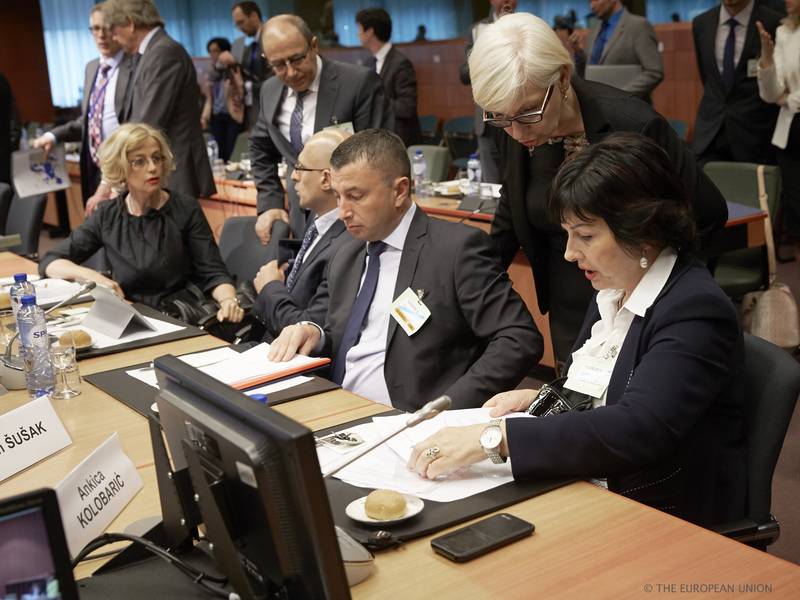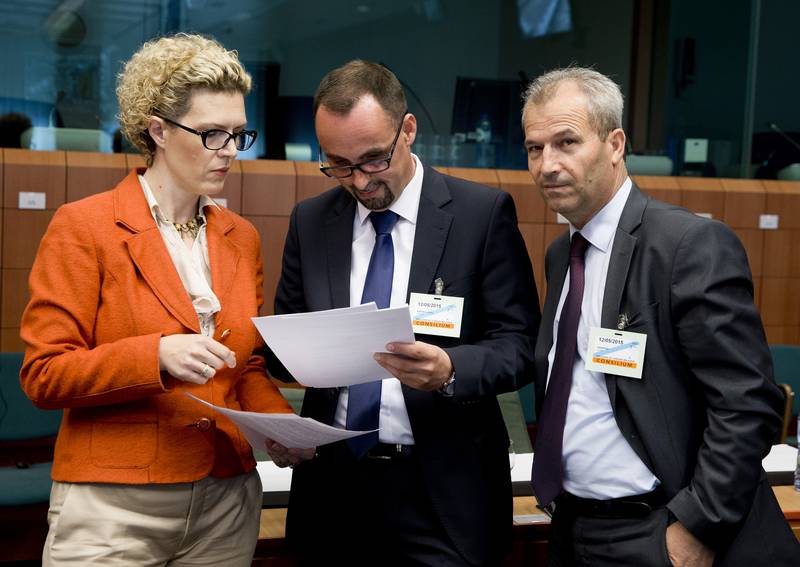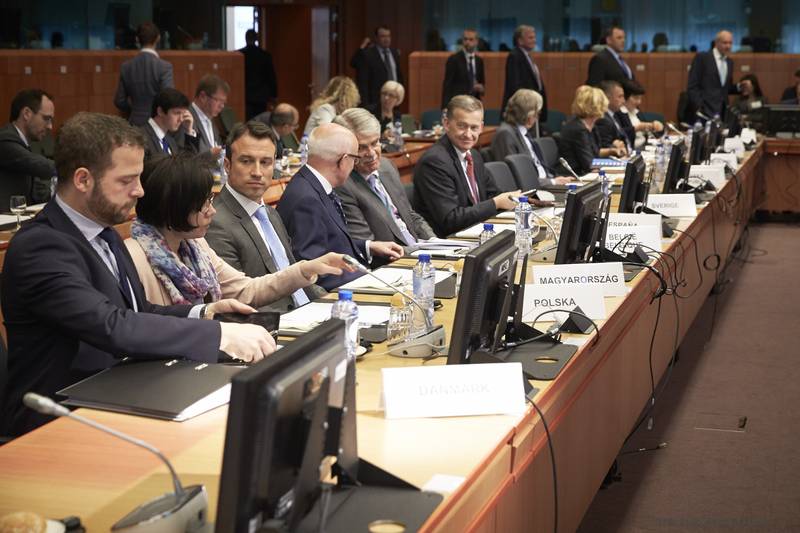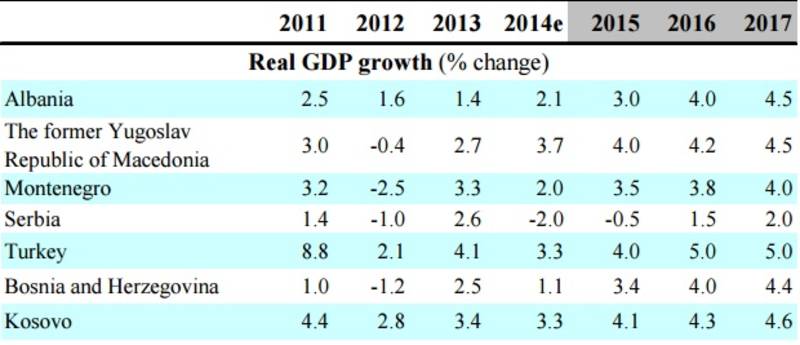European Semester for the Balkans – a New Instrument for Old Problems
Adelina Marini, June 16, 2015
 This is the first year in which the European Commission issues country-specific recommendations to the countries in the European enlargement process after they were included in the European Semester for closer economic policy coordination. The decision to include countries from the enlargement process in the European Semester was made back in 2013 when the European Commission presented the Enlargement Strategy for 2014. Main reason being not just the serious political but also the economic problems that candidate countries are facing, which require deep structural reforms. The Semester, however is quite different for candidates and member states, clearly seen in the specific recommendations. It is also different for each individual candidate country. For example, the EC issues two types of recommendations to the Western Balkan countries and only one to Turkey. Reason is the Western Balkan countries do not have functioning market economies and Turkey does.
This is the first year in which the European Commission issues country-specific recommendations to the countries in the European enlargement process after they were included in the European Semester for closer economic policy coordination. The decision to include countries from the enlargement process in the European Semester was made back in 2013 when the European Commission presented the Enlargement Strategy for 2014. Main reason being not just the serious political but also the economic problems that candidate countries are facing, which require deep structural reforms. The Semester, however is quite different for candidates and member states, clearly seen in the specific recommendations. It is also different for each individual candidate country. For example, the EC issues two types of recommendations to the Western Balkan countries and only one to Turkey. Reason is the Western Balkan countries do not have functioning market economies and Turkey does.
This is why the Western Balkan countries are expected to identify specific measures in their programs for sector policy reforms. It is the first time this year that they have drafted such programs and this is what the EC specific recommendations are based on. Common recommendation for all Western Balkan countries is to focus their investments on the creation of regional networks. Although most of these countries were a part of a single state – former Yugoslavia – their transport and energy infrastructures are currently highly isolated. This is a strong accent in the Berlin Process that started last year in Berlin and through Germany’s initiative marked the return of the EU to the region after a long absence.
Reading the economic analyses of the six Balkan states it is immediately noticed the European Semester starts to tackle problems that have been left unsolved for years. The conclusions in this year’s reports have minimum differences with previous European Commission assessments. It is yet to be seen if the European Semester will manage to trigger real reforms. At this stage, it has failed in EU member states, although it has the potential to inspire reforms due to Western Balkan problems being discussed in the presence of their assigned ministers in the Economic and Financial Affairs Council as part of the regular economic dialogue with the Western Balkans.
Montenegro – negotiating, but not reforming
Of all countries in the region it is Montenegro that is the most advanced in the process of European integration having been negotiating for accession for the past three years. Nevertheless, it still lacks a functioning market economy, continues to have problems with adequate budget planning (as do most countries in the region to various degrees), and is drawing back on planned reforms. Eight recommendations have been made to the state. First one is to adhere to its commitment to fiscal discipline by showing results from the implementation of the new fiscal framework and revise its debt management strategy. The introduction of additional barriers to early retirement and possible implementation of mandatory personal participation in pension funds is also recommended.
Like all region countries Montenegro has serious problems with non-performing loans and one of the eight recommendations is to address this issue. Amendment to labour law is also advised as well as higher market flexibility and real battle with the grey economy is started. Some of the other recommendations are educational system reform, synchronising the transport strategy with the regional connection program, improvement of the business environment and implementation of European food safety and phytosanitary standards to give the country access to the European market.
Macroeconomic data for the small Balkan state shows dynamic growth, high unemployment and rising debt. Forecast for Montenegro GDP growth this year is 3.5% and 3.8% for next year. Drop in unemployment rate to 18.2% is expected this year from 19.4% last year. The EC forecast for 2016 is for a continuing decline to 17.6%. Montenegro has the highest current account deficit of all countries in the region -13.3% for 2015 with only Albania being close to these numbers (-11.9%). Montenegro is also among the countries with highest public debt with a 63.2% estimate for 2015 by the EC, expected rise to 67.0% next year and a growing trend. Montenegro is first in the region in the Total Expenditure to GDP ratio – 48.2%. Serbia was leader until last year, but the ratio there is dropping.
Serbia, too, is not reforming
 If you follow Serbian media you might be left with the impression that Serbia is under radical economic reform. Serbian Prime Minister’s bragging about deep structural reforms largely disagree with the EC’s assessment that “The major structural obstacles to growth, clearly recognised in the programme, remain mostly unchanged from the previous year, encompassing an excessive state influence in the economy, an underdeveloped private sector, administrative and regulatory barriers to business, poor infrastructure and low level of investment, informalities and insufficient competition in some sectors”.
If you follow Serbian media you might be left with the impression that Serbia is under radical economic reform. Serbian Prime Minister’s bragging about deep structural reforms largely disagree with the EC’s assessment that “The major structural obstacles to growth, clearly recognised in the programme, remain mostly unchanged from the previous year, encompassing an excessive state influence in the economy, an underdeveloped private sector, administrative and regulatory barriers to business, poor infrastructure and low level of investment, informalities and insufficient competition in some sectors”.
There are seven recommendations to Serbia. First is to reinforce fiscal consolidation by using unexpected income to lower budget deficit. Aiding medium-term consolidation by implementing planned structural reforms. Advancement of restructuring and privatisation of state-owned enterprises with priority to large ones is also recommended. Reduction of state aid and execution of administrative reform. Same as Montenegro, Serbia has finance management and budget planning problems, although to a lesser degree. Improvement of the business environment, handling grey economy, simplification of regulations, labour market reform, and stimulating private investment are the rest of Serbia’s recommendations.
Serbia is the only economy in the region that is expected to remain in recession this year. Gross domestic product is expected to shrink by 0.5%. Unemployment in the country is among the highest in the region – 21.3% for 2015, expected to drop to 20.9% next year. Current account balance is among the best in the region -4.7% for 2015. Public debt is expected to reach 77.7% of GDP this year and continue to grow into next year (79.2%) Budget deficit for 2015 is 5.8%. Serbia has moved a step forward in the process of European integration by receiving a candidate country status, but is yet to open the first negotiation chapter and there is no indication as to when it will. It is highly unlikely real negotiations will start this year.
Macedonia – desperate need for transparency of public finances
According to EC and the Council the biggest challenge that Macedonia is facing is the improvement of fiscal discipline and transparency of public finances. Nine recommendations have been given to the former Yugoslav republic. Improvement of public finances, fiscal consolidation, providing data on public companies’ debt, state guarantees and outstanding payments. Labour market reform, solving the non-performing loans problem, improvement of business environment, fighting corruption and informal economy, improvement of access to financing for small and medium enterprises, acceleration of bankruptcy procedures.
Macedonia is champion (together with Albania) in economic growth in the region. This year its gross domestic product is expected to grow by 4.0% and another 4.2% next year. Unemployment, though is among the highest in the region – 27.0% this year, expected to drop to 25.9% next year. Current account deficit is lowest of all -3.9% but the EC expects it to grow to -4.6% next year. The country is among the few with low level of public debt. However, it is expected to grow to a level of 35.3% of GDP in 2015 and 37.3% in 2016. Budget deficit is close to the 3% limit of the Stability and Growth Pact in the EU – 3.5%. Macedonia has had the candidate country status for ten years, but is yet to open its first negotiation chapter due to Greece’s veto in the Council.
Albania is progressing, but has problems in the banking sector
Tirana received a candidate country status last year with Serbia and is also yet to start negotiations. It is, however, one of the rare cases of a Western Balkan country showing progress in some reforms. Its biggest problem is the banking sector. As with all other countries in the region levels of non-performing loans in Albania are extremely high which is why the EC recommends looking into this issue with priority. Banks are well capitalised and highly liquid, but euroisation poses credit risks. Another sector problem is that banks are exposed to sizable sovereign risk by holding huge portfolios of government bonds.
Albania has eight recommendations, including the regular one for administering fiscal consolidation. Albania has a specific electricity market problem and one of the recommendations is towards lowering distribution losses and improving on collection of due bills. Passing and implementing of a law for higher education and the creation of an independent university accreditation system are also expected. Another regular recommendation for the region is improving the business environment by l owering administrative and regulatory barriers. Adopting a transport strategy and acceleration of energy sector liberalisation.
owering administrative and regulatory barriers. Adopting a transport strategy and acceleration of energy sector liberalisation.
Albania is expected to reach economic growth of 3.0% this year, unemployment rate is among the “low” ones in the region – 16.4% is this year’s forecast, with a decline expected next year. Albania is the other state (besides Macedonia) with high current account deficit -11.9% of GDP this year with the gap expected to grow to 12.6% in 2016. It has already lowered its budget deficit considerably from a -5.1% in 2014 to expected -3.9% of GDP this year. It has the second highest public debt in the region after Serbia – 71.6% of GDP for 2015. The country has the second lowest total public spending as a percentage of GDP- 31.7%. Highest level is in Macedonia.
Bosnia and Herzegovina suffers a highly underestimated risk
The most important conclusion in the statements following the dialogue between the Council of ministers and countries of the Western Balkans is that the program for economic reforms of Bosnia and Herzegovina consists of two separate reports for each entity instead of an overall review of measures to cover the entire country by sectors. According to EU ministers this poses a serious obstacle to a comprehensive assessment of measures and the possibility to recommend steps for improvement of the economic situation, which is appraised as pessimistic. This is why one of the recommendations to Bosnia and Herzegovina is to create a single economic space within the country by resolving the complex and often contradictory law and regulation frameworks between the different jurisdictions. This includes solving the problem of missing internal coordination between all government levels. Discrepancies between laws and regulations on all levels of governance are also a problem.
In this sense, the business environment is the biggest challenge. Bosnia and Herzegovina has 11 recommendations, including improvement of budget administration, creation of a fiscal council, efficient implementation of budget law, restructuring, privatisation, and efficiency improvement of state companies, especially in the Federation. It is expected of the state to further lower the costs for starting or closing a business, to solve the non-performing loans problem, create a unified economic space and internal coordination, creation of transport policy and strategy. The creation of an energy strategy is also advised.
Despite problems, BiH GDP is expected to grow this year by 3.4% with a forecast for 4.0% growth next year. Unemployment, however, continues to soar. It is expected to be 27.0% this year with a tendency for slow decline. The level of public debt of BiH is relatively low – 38.9% of GDP and is expected to drop to 31.7% in 2017. BiH has the lowest budget deficit in the region at -1.7% GDP.
Kosovo – too dependent on the public sector
 The Kosovo economy suffers great uncertainty with the highest risks stemming from the country’s dependency on external and public sectors, weak investment climate and bad condition of human capital. Kosovo also suffers a lack of credible medium-term budget planning, which in previous analyses was pointed out as a large problem in most Western Balkan countries, but this year the situation is quite diverse. Kosovo remains the most severe case in this indicator. It is the only country where non-performing loans are claimed contained. At the same time, the level of enforcement of contracts is very low. Interest rates on loans are too high reflecting the high credit risk associated with widespread informality of the corporate sector and the law environment.
The Kosovo economy suffers great uncertainty with the highest risks stemming from the country’s dependency on external and public sectors, weak investment climate and bad condition of human capital. Kosovo also suffers a lack of credible medium-term budget planning, which in previous analyses was pointed out as a large problem in most Western Balkan countries, but this year the situation is quite diverse. Kosovo remains the most severe case in this indicator. It is the only country where non-performing loans are claimed contained. At the same time, the level of enforcement of contracts is very low. Interest rates on loans are too high reflecting the high credit risk associated with widespread informality of the corporate sector and the law environment.
Recommendations to Kosovo are 10. Apart from the regular ones on fiscal discipline and business environment improvement, the country-specific recommendations are focused on improving the budgeting process, solving the high bank-financing cost problem, the lack of control on large infrastructure projects, fighting corruption, improvements in public procurement. Kosovo’s economic growth this year is expected to reach 4.1%. On the other hand, the country has the highest unemployment rate in the region – 28.7% for 2015 with 29.0% last year. Kosovo has the lowest public debt to GDP ratio – 12.4% at the moment, although debt is expected to grow despite the budget deficit being within the limits of the Stability and Growth Pact. This year’s budget gap is expected to be -2.1% of GDP.
The idea of introducing the European Semester to the Western Balkan countries is wonderful and has potential for great results. It should, however, go in parallel with a political dialogue with many of those countries having, practically, authoritarian regimes, hindering the realisation of many of the structural reforms expected. High unemployment in the region is also a huge problem to the EU, creating the still large number of economic refugees that create stronger opposition in many of the member states. It is commendable that more member states are starting to pay attention to the countries in the region after a long time of looking the other way. What is important now is that this attention is correctly channelled to where it is most needed so it creates a sustainable trend of political and economic transformation.
A difficult and long-term task it may be, but not impossible. Lessons learned from previous enlargements can point out well enough mistakes, oversights as well as good decisions. It is important to note that the EU is operating in a different enlargement environment. If up to 2007 the EU was the only possible option it is not anymore. The countries queueing in line are becoming more eurosceptic and losing faith in the significance of European integration.
 Bakir Izetbegovic, Andrej Plenkovic | © Council of the EU
Bakir Izetbegovic, Andrej Plenkovic | © Council of the EU Aleksandar Vucic, Recep Tayyip Erdogan | © Serbian Presidency
Aleksandar Vucic, Recep Tayyip Erdogan | © Serbian Presidency Jean-Claude Juncker, Zoran Zaev | © European Commission
Jean-Claude Juncker, Zoran Zaev | © European Commission